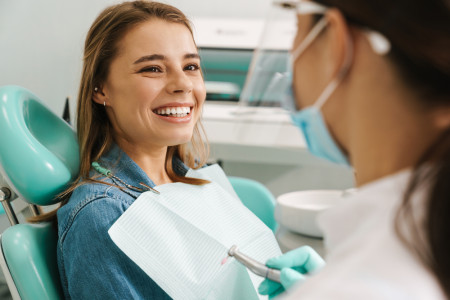Quickly Locate a 24-Hour Emergency Dentist in Tallahassee, FL
Did you know that about 2 million people visited emergency rooms for emergency dental care in 2018? That statistic shows that anyone can experience a dental emergency. Worse yet, dental emergencies tend to occur when regular dental offices have closed. You need to know whom to call or where to go when a dental emergency strikes in Tallahassee, FL. That’s often a challenge, as most emergency dentists in this city have tight schedules. Some even turn their phone lines off at night.
Luckily, our referral service has the direct contact information of most emergency dentists in Tallahassee, FL. That means we can help you get emergency dental care even at midnight when no one else can. Our toll-free emergency dental line is 844-700-1220. Ensure you have that number on your speed dial. It’ll save you from unnecessary stress and worry whenever you need to find a Tallahassee emergency dentist.
How to Deal with Most Common Dental Emergencies in Tallahassee, FL
Knowing the steps to take when dental emergency strikes can help you save your permanent tooth. It can also reduce the level of risk to your oral health. Here are emergency actions to take when dealing with the following common dental emergencies:

Knocked-out Tooth
A knocked-out tooth is a common dental emergency in Tallahassee, Florida, and the U.S. at large. In fact, sports injuries cause over 5 million knocked-out teeth among children and adults each year. Nerves, tissues, and blood vessels of an avulsed tooth stay viable for a short duration. Having an emergency dentist return the tooth to its socket within 60 minutes can improve the chances of its survival.
What to Do
- Set an emergency appointment with a Tallahassee emergency dentist. You can also visit a walk-in dentist near you if an emergency occurs during regular office hours. Our referral specialist can give you a list of walk-in dentists and emergency dental clinics near you. Just call our 24/7 phone number.
- Find the tooth, hold it by the crown, and wash off the dirt with lukewarm water. Do not overhandle, overclean, or touch the root.
- Try to reinsert the tooth in the socket. You can also hold it between the gums and cheek.
- If you cannot return the tooth to its natural socket, keep it inside a cup of cold milk, your saliva, or water. The goal here is to keep the tooth’s attached tissue moist.
- Apply a cold compress to soothe the pain
- Be sure to arrive at your dentist’s office immediately. If possible, get to the office within 20 minutes after the incident.
- The emergency dentist will examine the avulsed tooth to determine if it can be replanted successfully. If so, he or she will try to replant it. He or she might need to complete root canal therapy if the pulp chamber has suffered damage.
The dentist will recommend a replacement option if the tooth has suffered permanent damage. Your options for replacing a missing tooth include dental implants, dentures, and bridges.
Loose or Partially Dislodged Tooth
Trauma or severe decay can cause your tooth to loosen or partially dislodge from its natural socket. In this situation, visit an emergency dentistry practice near your Tallahassee home.
What to Do
- Make an emergency dental appointment with an open dental office near you. Alternatively, call our dental hotline 844-700-1220 for help setting this urgent appointment.
- Gently bite the loose tooth with your other teeth to keep it in the socket as you prepare for your emergency dental visit.
- Take over-the-counter medications for temporary relief from your pain.
Your dental professional will adjust the tooth to its correct position and secure it with splints. The professional might do a root canal procedure if the underlying problem is an infection in the tooth’s inner layer.
Broken or cracked Tooth
Your teeth are covered by a hard outer layer called enamel. The enamel consists of 96% solid mineral, making it the strongest substance in your body. This substance is even harder and stronger than your bones. That doesn’t mean your teeth are immune to cracks, breaks, or fractures. Trauma, biting hard objects, or grinding can cause your teeth to crack, chip, or break.
What to Do
- Contact a local dentist to organize an emergency visit
- Collect the pieces and rinse off the dirt with warm water
- Preserve the pieces in cold milk or saliva
- Use warm water to swish your mouth
- Apply a piece of gauze to the injured area for a few minutes to stop bleeding
- Put a cold compress on the cheek over the injury site to alleviate pain and reduce swelling
Treatment options for cracked or broken teeth vary with the extent of break or crack. A crack that stretches into the root will require root canal therapy to save the tooth.
Loose or Broken Dental Fillings or Crowns
Dental crowns or fillings can break or loosen due to trauma, further decay, or constant wear and tear over time. When the crown or filling eventually falls out of the mouth, it leaves the affected tooth exposed. The tooth may develop sensitivity to hot or cold temperatures.
What to Do
- Call an emergency dental office to schedule a visit
- Smear clove oil or dental cement on the affected tooth to ease pain
- Store the crown or filling properly
- DO NOT try to reattach the crown or filling with any glue
Your dentist will inspect the crown or filling to determine if it’s still intact. If so, he or she will reapply a restoration material and reattach it to the affected tooth. If it’s severely damaged, he or she will make a new crown or filling and place it.
Soft Tissue Injuries
The injuries affect the gums, tongue, cheeks, and lips. They occur due to accidental bites, blows to the mouth, or biting something extremely hot or hard. Soft tissue injury symptoms include puncture wounds, lacerations, cuts, and bleeding.
- What to Do
- Clean your mouth with salt water
- Place moistened gauze on the injured area to stop bleeding.
- Apply a cold compress over the injured area for 10 minutes to minimize swelling and ease pain.
If you cannot control the bleeding, rush to a dental office in your neighborhood. You can also visit a local emergency room. Meanwhile, keep gently biting the gauze on the bleeding site until a dental professional can see and treat you.

Helpful Tips to Prevent Dental Emergencies
The best way to avoid the stress and pain associated with emergency dental problems is to avoid them altogether. Here are helpful tips to help you prevent dental emergencies:
Embrace Good Oral Hygiene Practices at Home
Take control of your oral health by observing good oral hygiene practices daily. Brush twice every day. Ensure your sessions last for at least two minutes. Floss around your teeth once every day. A regular mouthwash rinse can also improve your oral hygiene significantly.
Routine Checkups
Your dentist is your trusted partner in keeping dental emergencies away. The dentist can thoroughly clean your teeth and remove plaque and tartar during regular checkups. He or she can also detect infections at their initial stages and treat them.
Other preventative dentistry tips include:
- Avoiding sugary foods and drinks
- Wearing a mouthguard during contact sports and leisure activities
- Using tools like bottle openers or scissors to open items
Team Emergency Dental
3800 Esplanade Way , #306 Tallahassee, FL 32311
(844) 700-1220
